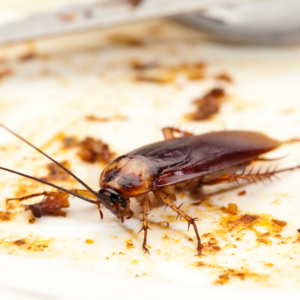
Spring is known for its warmer weather, flowers, rain-- and allergies. Pollen, grass, weeds, and other hallmarks of springtime kick off what is commonly known as allergy season every year. Over the course of several weeks, millions of Americans complain about itchy eyes, sneezing, coughing, hives, and some, even, asthma. Many attribute these to pollen-- however, spring also triggers a very active season for one pest linked to allergies: cockroaches.
Believe it or not, cockroaches are a fairly common indoor allergy. Studies have suggested that between 17% and 41% of people in the United States are allergic to cockroaches. Let's take a look at how cockroaches contribute to springtime allergies, and what you can do about them.
An Active Time for Cockroaches
Cockroaches tend to take on spring in full force. While it might seem like they're another outdoor pest that becomes more active in spring, it's actually the opposite. As temperatures rise, they move indoors in search of food and moisture. Additionally, cockroaches that may have been hiding during the wintertime will emerge during this time. Eggs that have been laid in winter will begin to hatch, which contributes to a noticeable boost in cockroach activity. Living indoors also allows these pests to have a predator-free breeding ground. More often, you will notice them come out at night, when they forage for food and mate.
Cockroach Allergies and Risk Factors

You're very likely to be exposed to cockroaches and their allergens, especially in spring. In fact, the National Pest Management Association (NPMA) found that 63% of American homes contain cockroach allergens. Cockroach allergies can be triggered by their saliva, feces, and body parts. Just like dust mites, these allergens can aggravate symptoms when they're kicked up into the air. In some cases, these can cause people to wheeze or trigger asthma attacks as well. Some symptoms of cockroach allergies include:
- Coughing
- Congestion
- Rashes or hives
- Sinus pressure
Though anyone can be allergic to cockroaches, they're more likely to affect children than adults. Your risk for developing a cockroach allergy increases if you have:
- Asthma
- Eczema
- Hay fever
If you're displaying symptoms or have concerns about cockroach allergies, you may need to meet with your healthcare provider. They may evaluate your symptoms and refer you to an allergist.
Preventing Cockroaches from Entering Your Home
In Florida, it's not uncommon to have cockroaches sneak in during spring. The easiest way to lower your risk of cockroach allergies is to reduce your exposure to them. Some of the most effective preventative measures include:
- Keeping a clean home: Regularly take out trash and clean up spills & crumbs immediately. Vacuuming, mopping, and cleaning surfaces also deters cockroaches.
- Properly seal & store food sources: Securely close food containers and your trash. This includes pet food.
- Seal any cracks or openings: Cockroaches are likely to enter through small openings in your home. Be sure to seal any holes, cracks, or utility entrances.
Spring Against Allergies with Pest Control Professionals
If you notice excessive cockroach traffic, it's time to reach out to a pest control professional. Turner Pest has 50 years of industry experience and proven methods to eradicate cockroaches. Our technicians also have a variety of preventative treatments to keep them from coming back. After a thorough evaluation of your home, we'll provide you with a custom treatment plan and estimate.
It's time for spring cleaning. Don't risk exposing your family to dangerous allergies from dirty pests. Give us a call at (800) 225-5305 or schedule a free inspection.
